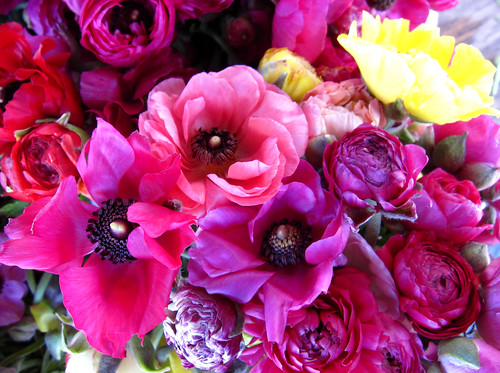organic spring flowers by digiyesica
Flower U-Pick by Suzies Farm
Are you into Organic living in a big way? Or are you interested in getting started going over to an organic lifestyle? Or are you concerned about the environment’s health? Or are you concerned about your own health and so you want to be more organic? Whatever your reasons for wanting organic, there are now many gardening sources where you can buy items that say they are organic.
What does organic mean? Well, let us look at the definition of organic farming:
“Organic farming can be defined by the proactive, ecological management strategies that maintain and enhance soil fertility, prevent soil erosion, promote and enhance biological diversity, and minimize risk to human and animal health and natural resources.” (see here)
What is organic food?
“[These are foods that] do not involve modern synthetic inputs such as synthetic pesticides and chemical fertilizers. Organic foods are also not processed using irradiation, industrial solvents, or chemical food additives.” (see here).
There are even organic pesticides and extermination companies- so you see that just because it is organic, does not mean that it cannot kill or hurt; it just minimizes the risk to the environment and nature. (For example, poison ivy may be organic, but you don’t want to use it.) All companies who advertise themselves as organic have to be government certified. Though requirements vary from country to country, there is a list of general requirements that all countries seem to agree about, for example, one requirement is not using synthetic fertilizers on farmland for a specified number of years- I think the minimum is 3 years in the US. (see here)
If you want to be sure that you are getting organic products and you want to know what government stamp of certification to look for in the USA, you can check on the USDA Organic Certification website or contact them.  In Canada go to this site. In England go to this site. In Europe check out the requirements here.
Now it is that time of year that you are getting serious about ordering seeds or plants for your garden but want only organic or especially organic materials to use. Where can you go to buy these products? There are lists of organic catalogs you can order from that contain such websites as Johnny Select Seeds or heirloom seeds.
There are many organic vegetable plant companies on line such as this and this and this.  And of course, there are organic perennials and herbs nurseries to get the organic plants you are wanting. (see here) And one of TheGardenLady’s favorite places to go for organic herbs is Richter’s herb catalog.
Here is what Richter’s say about their organic plants: Already in the 1960s we were selling organically grown bedding plants and herbs and vegetables, long before people understood the significance. In the early days it was really tough to keep up that commitment because people only saw the leaves that were lighter green or had the occasional whitefly or spider mite on them. “Organic†certainly did not have the cachet it does now, and early on it was even a bit of a drawback from a marketing standpoint because wholesale customers had no patience for bugs and blemishes.
What about organic bulbs and tubers? Organic bulbs are more difficult to find. There is only one website that advertises itself as the ” US only certified organic flower bulb company.” They have organic tulip bulbs which, they say, ” grow stronger, brighter and last longer.” This is a company in Virginia called EcoTulips that sells other organic flowering bulbs like daffodils as well as some tubers like dahlias. Visit EcoTulips on March 30th through April 14 for their Tulip festival. Here is another blog that writes about the difficulty of finding organic flower bulbs.


